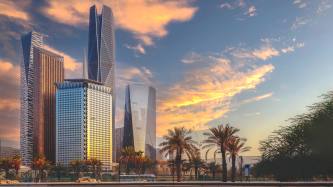So says Dr Omar bin Sulaiman, director general of the Dubai International Financial Centre (DIFC), which owns the exchange.
Dubai is no stranger to ambitious projects. In an interview with The Banker, Dr Omar outlines the strategy not only behind the exchange but also behind the various sectors that he describes as Dubai’s ‘cluster economy’ concept. Inspired in part by Harvard business guru Michael Porter, Dubai, under crown prince Sheikh Mohammed bin Rashid al Maktoum, has embarked on a diversified strategy incorporating a number of business clusters that act as hubs for the region.
Track record
Dr Omar notes that it was only in 1992 that Dubai decided to focus on tourism. By 2004 the number of tourists had grown to 5.6 million and is forecast to reach 15 million by 2010 – more than the combined figure for India and Egypt, he says. The number of passengers passing through Dubai Airport reached 21 million and is expected to reach 50 million in 2010. A new airport is being planned, he says.
Dubai’s ambitions stretched beyond oil, traditional trading and tourism. In 2000, the Internet City concept was born. “We needed to attract knowledge workers and knowledge companies in a hub concept,” says Dr Omar. As chief executive of Dubai Internet City, he saw it develop into a large information and communications community, incorporating the major global players from Microsoft to IBM and Cisco.
In January 2001, Dubai Media City was begun. Dr Omar says that the cluster concept is proving extremely successful with both the Internet and Media cities attracting a combined 30,000 knowledge workers and 9900 companies to date. Dubai Internet City is considering extending its model to India.
Strategy development
An engineer with a doctorate in leadership, Dr Omar is now turning his entrepreneurial spirit to financial services. The DIFC Authority, which he heads, is one of three core bodies in the DIFC. It is responsible for developing strategy and implementing the centre’s objectives. Other key institutions are the independent regulatory and supervisory body, the Dubai Financial Services Authority (DFSA), and the independent DIFC Judicial Authority.
International credibility is the key if the DIFC wants to fulfil its vision of filling the gap not covered by financial centres in Europe, the Far East and North America. A strong independent regulatory and judicial system is critical. Dr Omar acknowledges that there were shortcomings last year when the two top regulators were summarily sacked, with one, Philip Thorpe, now heading up the Qatar Financial Centre. “There were miscommunications; we did not know how to deal with the international media community. We should have explained more,” he says.
The DIFC learned the hard way from the sackings and Dr Omar believes that the models that are now in place incorporate global best practice and provide huge opportunities for the region. The DIFX will be able to offer a wide range of securities, both traditional and Islamic, and provide investors and issuers with access to the deep pool of liquidity available in the Gulf.
Business sources
Will the DIFX be able to take business away from other Gulf bourses? It is unlikely to attract Gulf IPO listings – they will stay at home – but Dubai hopes to attract secondary listings and the international business that would have gone to Europe or elsewhere. And given the massive funds in the region on the back of higher oil prices, the DIFX has opened at the right time.
Like the moves into tourism and other clusters, Dr Omar does not expect massive trading volumes from day one. However, with institutions such as Merrill Lynch, Credit Suisse and Standard Chartered on board and 72 companies listed, the DIFC and the DIFX hope to build momentum fast. Given the positive economic conditions in the Gulf and Dubai’s track record in developing new ventures, the financial hub and the DIFX could be clear winners.











